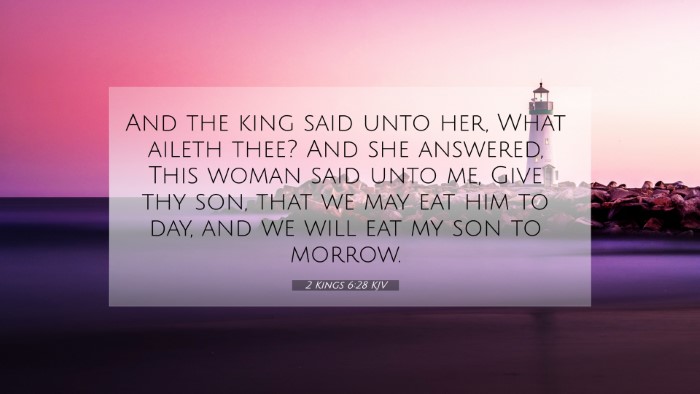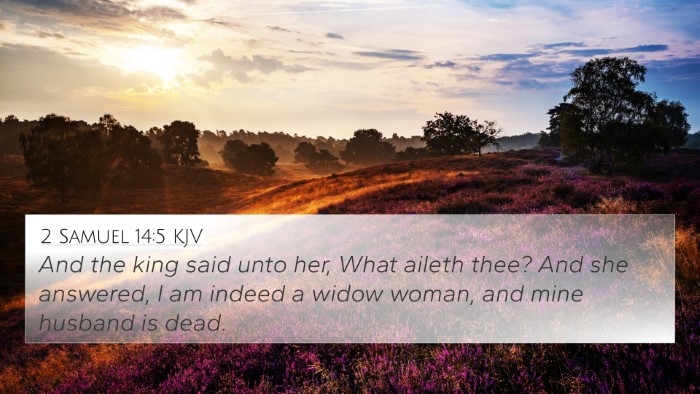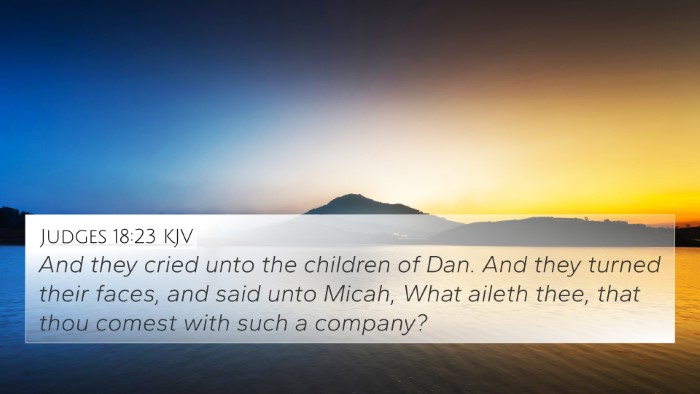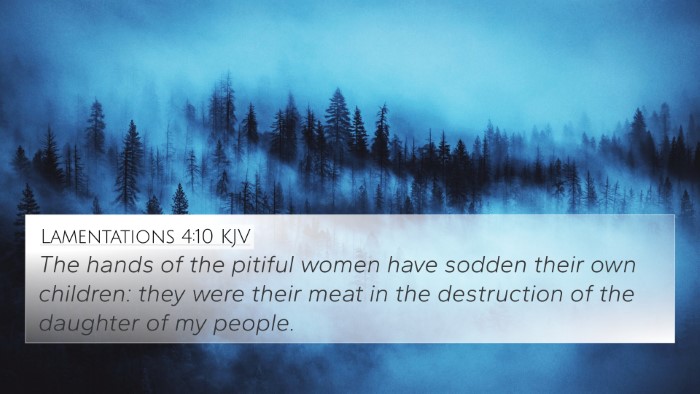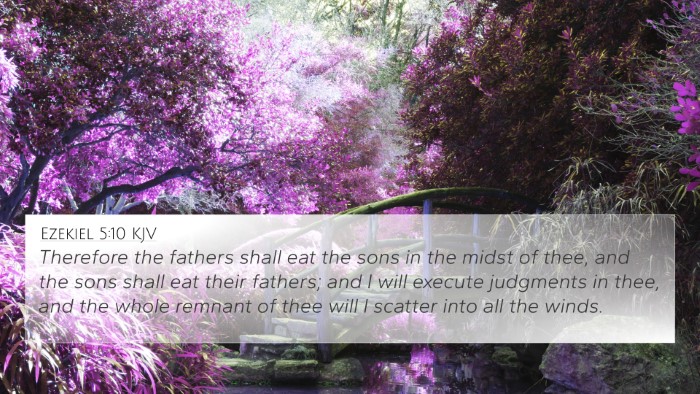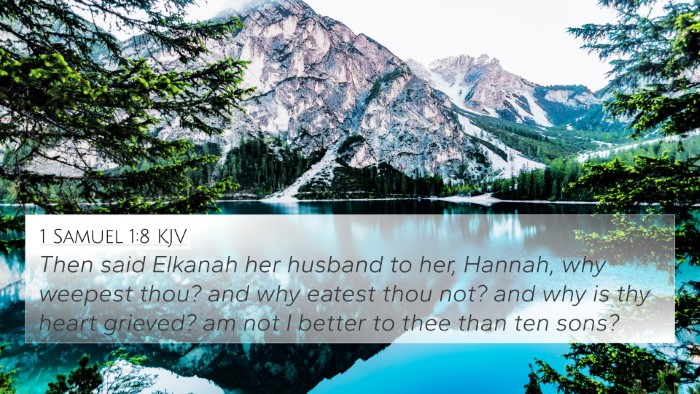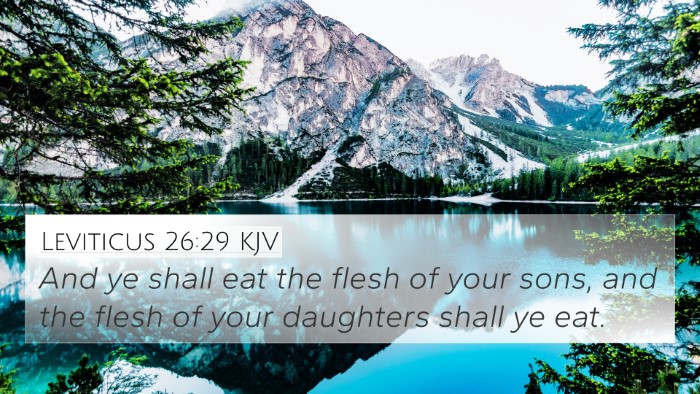Meaning and Interpretation of 2 Kings 6:28
In this verse, we witness a heart-wrenching moment during a time of severe famine in Samaria. King Jehoram is confronted by a woman who expresses her despair over the dire situation. She reveals a horrifying agreement made with another woman to consume their children due to the utter desperation caused by the famine. This verse highlights the depths of human distress and the moral decay that can occur in such circumstances.
Commentary Insights
- Matthew Henry: He reflects on the stark reality of famine that leads to unthinkable acts. Henry notes the desperation felt by the people of Israel, emphasizing the absence of God's providence during this trial. He also points out the failure of leadership in times of crisis and the consequences of sin that result in such suffering.
- Albert Barnes: Barnes emphasizes the extreme hunger that led to such a tragic agreement between the women. He suggests that this incident is a vivid illustration of the promise of God’s judgment upon His people for their disobedience and idolatry. It serves to show how far societal decay can lead individuals into moral calamity.
- Adam Clarke: Clarke explores the context of the verse, noting the psychological impact of famine on the community. He comments on the historical and cultural implications of such an extreme act where mothers would resort to cannibalism, pointing out the hopelessness that had overtaken the inhabitants of Samaria.
Thematic Connections to Other Bible Verses
This passage relates to multiple other biblical themes, demonstrating the interconnectedness of scripture:
- Deuteronomy 28:53-57: This passage speaks of the curses that would befall Israel, including dire hunger leading to cannibalism.
- Lamentations 2:20: Similar themes of despair during besieged Jerusalem also highlight the anguish of mothers and their children during times of judgment.
- Matthew 24:19: Jesus speaks of the great tribulation and how such woes will come upon those who are unprepared, echoing the calamity in 2 Kings.
- Isaiah 9:21: References to fragmentation and strife within families further illustrate the inner turmoil resulting from God’s judgment.
- Jeremiah 19:9: This verse similarly discusses the terrible fate awaiting the people juxtaposed with their disobedience.
- James 5:1-4: The wealthy oppressors and their ultimate downfall resonate with the suffering of the people during the famine.
- Romans 8:22: Paul references the groaning creation, linking physical suffering to spiritual decay and longing for redemption.
- Revelation 6:5-6: Kindred themes appear in the descriptions of famine as part of the judgment, underscoring the seriousness of sin.
- 2 Peter 2:6: The destruction of Sodom and Gomorrah serves as an alarming reminder of the consequences of sinful lifestyles.
- Luke 21:23: This verse details the fate of those who suffer due to their surroundings, paralleling the desolation seen in 2 Kings.
Verse Context and Historical Background
To fully grasp the significance of 2 Kings 6:28, it’s essential to consider the historical context. The famine in Samaria resulted from a siege by the Arameans, reflecting both military failure and spiritual decline among the Israelites. This turmoil was a direct consequence of their abandonment of God, as seen throughout the reigns of the kings of Israel.
Application and Reflection
This verse urges believers to reflect on the dire consequences of turning away from God and indulging in sin. It serves as a sobering reminder of the need for reliance on divine providence during difficult times. Furthermore, the emotional and moral implications it raises challenge modern readers to consider how desperation can lead to decisions that defy ethical standards.
Conclusion
2 Kings 6:28 presents profound lessons that resonate through the ages, connecting with various themes and teachings within the wider biblical narrative. By engaging in comparative Bible verse analysis and cross-referencing, believers can extract deeper meanings and ensure a connected understanding of God’s word, thus ensuring the application of these lessons in daily life.
Further Study and Tools
For those interested in exploring cross-referenced themes in the Bible, consider utilizing tools for Bible cross-referencing, such as a Bible concordance or a cross-reference Bible study guide. Understanding how various verses interlink will enhance your overall comprehension and reveal intricate patterns of God’s messages throughout scripture.


